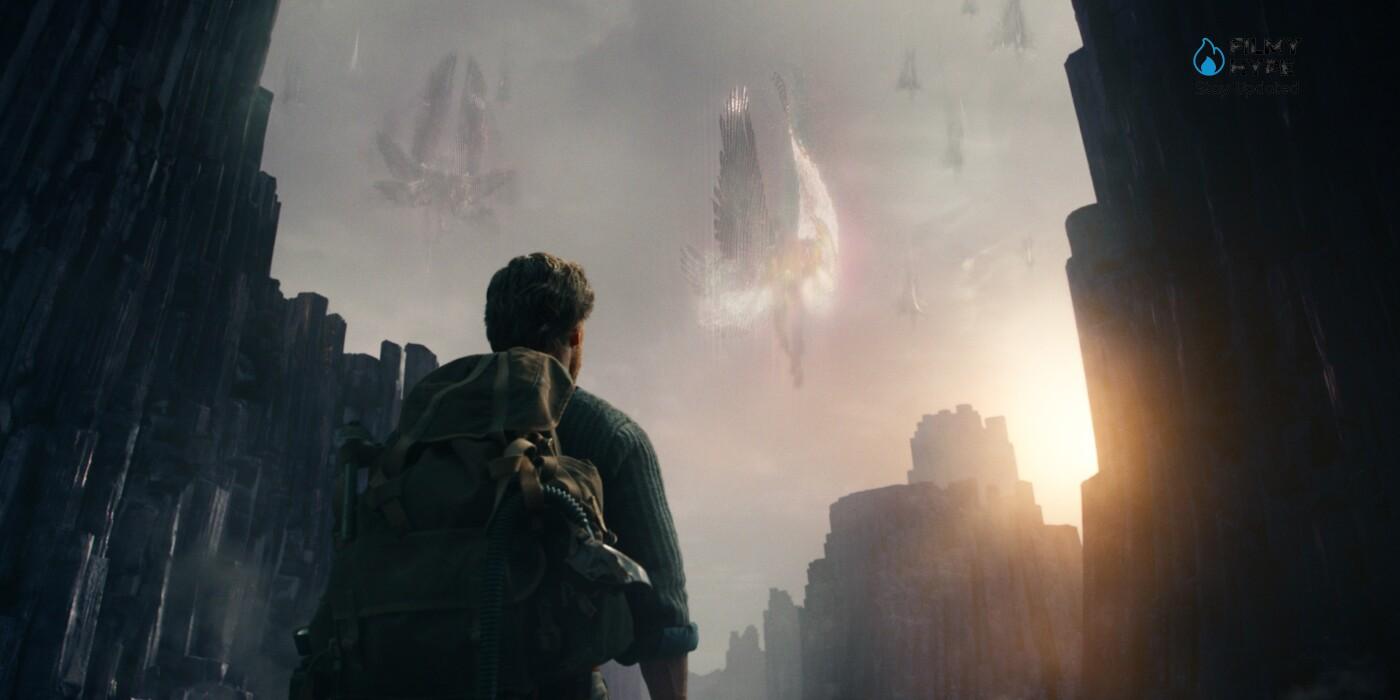His Dark Materials Season 3 Ending Explained: Why Lyra Sacrifice Her? The Fallen Angels?
In recent days, the third and final season of His Dark Materials (which we wrote about in our review) HBO, which marks the final act of the adventures of the young Lyra Belacqua, played on the small screen by Dafne Keen. The series is co-produced by the BBC and HBO and faithfully adapts the homonymous trilogy of novels born from the pen of the British author Philip Pullman, after the ill-fated cinematic attempt of The Golden Compass, in 2007. Between talking bears, magical portals, talismans, witches and prophecies, the saga is fully part of the fantasy genre, like other cornerstones of the genre such as The Lord of the Rings, The Wheel of Time, Game of Thrones and The Witcher.

It will certainly not have escaped viewers of the third season, however, that the fantastic universe of His Dark Materials is not inspired, as frequently happens, by Nordic mythology, the medieval world, or the traditions of Eastern Europe, but by the sphere of religion Judeo-Christian. During the eight episodes of the last act of the series we were bombarded by constant references to angels, Eve, the serpent, original sin and the figure of God himself, who here takes the name of “Authority”. Something, however, seems decidedly out of place: God, his angel Metatron and the Catholic Church – which in the saga takes the name of Magisterium – are the evil antagonists of the saga, and the heroine is the new Eve, called by a prophecy to “repeat original sin” to free humanity. How was this bizarre universe born? Many have called the series a reverse version of The Chronicles of Narnia. Let’s try to find out why by exploring the ancient mythology that underlies the show in this explanation of the His Dark Materials series.
His Dark Materials Season 3: Plot Summary
The third and final season of His Dark Materials opens with a prelude dedicated to the origin of the cosmos: at the beginning of time, an angel usurped the celestial throne and made all his peers believe he was a God. Many other angels rebelled against the imposter but were banished to the multiverse, spawning Dust. Thus began the rule of the Authority, the false god revered by the Magisterium and other religious institutions of the various parallel worlds. And it is precisely against this Authority that now Lord Asriel is preparing to wage war, gathering in a single faction the fallen angels and rebellious humanity of the various parallel worlds.
His intentions are noble, but his methods – as we already know by now – are decidedly less so. Meanwhile, Lyra Belacqua is unconscious, a prisoner in a remote stone building on the Atlantic coast: her mother Marisa keeps her in that state, determined to keep her hidden from the Magisterium even against her will. On her trail, however, is Will Parry, who, after witnessing his father’s death, is determined to use the powers of the subtle blade to reach her and bring her to safety. Once reunited, however, the two protagonists will have to choose their next move carefully: follow the two angels Baruch and Balthamos to join Asriel’s great war, or descend into the realm of the dead to meet poor Roger one last time, who continues to haunt Lyra’s dreams? Will’s dagger is the only weapon that can kill the Authority…
His Dark Materials Season 3 Ending Explained: When Fantasy Meets Religion?
The Chronicles of Narnia is a cycle of seven books created by Clive Staples Lewis (1898-1963), progenitor writer, together with Tolkien, of fantasy literature. After a television transposition for the BBC in the 1980s, the saga landed in cinemas with three films: The Lion, the Witch and the Wardrobe (2005), Prince Caspian (2008) and The Voyage of the Sailing Ship (2010). Now the rights have been bought by Netflix, which intends to start from scratch and make a complete adaptation of the entire cycle (Greta Gerwig is rumored to be involved, but the news has not been confirmed). As typical of fairy-tale imagery, the saga is populated by fauns, witches, minotaurs and all sorts of talking animals.
If we go beyond appearances, however, it is quite simple to glimpse the presence of a religious element here too, openly inspired by the Judeo-Christian universe: the saga opens with the creation of the magical world of Narnia, and in the second volume proposes the death and resurrection of the divine savior of Narnia, the lion Aslan. As if that weren’t enough, in the following chapters the adventures are set during the reign of his “earthly vicars”, the Pevensie brothers, to finally end with the advent of a false Aslan and a real apocalypse, complete with universal judgment.
In short, behind the fantastic adventures of the protagonists lies an authentic fantasy adaptation of the Bible, aimed at an audience of all ages. By contrast, in Philip Pullman’s literary saga that underpins d Materials, the heroes are at war with a religious institution explicitly inspired by the Catholic Church, and in the last act, they allied themselves with fallen angels to even fight against God. himself, who governs the Kingdom of Heaven. In short, the fantastic universe of His Dark Materials is the exact opposite of that of Narnia.
The Magisterium, the Dark Face Of The Church?
Since the first two seasons of These Dark Materials we have become acquainted with the Magisterium, a strictly hierarchical religious institution, which holds the monopoly of faith, hunts witches, advocates obscurantism and hinders scientific research. If the presence of the symbol of the cross and titles such as “cardinal” weren’t enough, the analogy with the Catholic Church is also explicitly reaffirmed in the second season, in which the protagonists discover the existence of the multiverse. Lyra Belacqua comes from the fantasy world where the Magisterium reigns, while Wil Parry, who is native to our planet, explicitly recognizes how here the Church is its perfect equivalent. In the third season, we briefly encounter yet another version: the Temple, also ruthless, bigoted and obscurantist.
In short, it is quite evident that the common factor of the various parallel versions of the Church is that of being a male chauvinist, corrupt and oppressive institution, always ready to condemn free thinkers. Lord Asriel, obsessed with the search for infinite worlds, in this sense can well represent an equivalent of the figure of Giordano Bruno, a Renaissance humanist condemned to the stake for precisely the same theories. It is useless to hide: on a political and ideological level, the TV series These Dark Materials proposes a very harsh criticism of the historical degeneration of ecclesiastical power. But if this aspect was rather explicit and evident, it would have been just as legitimate to expect to discover that there is no God, nor any Kingdom of Heaven. Surprisingly, however, in the third season, we discover that this is not the case: the angels, the Kingdom of Heaven and God himself exist, but they are very different from what we believe.
God as Antagonist: The Influence of the Apocrypha?
Where does this bizarre idea of turning God himself into the final antagonist of the saga come from? At the risk of making some readers laugh, let’s immediately put our hands forward: this is not a veiled form of Satanism or other similar drifts! That of These Dark Materials is a message-oriented towards the values of freedom, peace and tolerance. Let’s take a closer look at the opening of the first episode of the third season, in which the fallen angel Xaphania reveals to us what happened when the universe was born: “For many millennia, the Authority has ruled the Kingdom of Heaven, exercising absolute control. She has given herself the names of Father, Creator, Almighty, but she is none of these, she is just an angel like us”.
Technically speaking, therefore, the antagonist of the series is not God himself, but an imposter. If we think about it, in the TV series a real God does exist, and it is the cosmic force that created the universe and permeates it in the form of Dust. The Authority, on the other hand, is a usurper, a corrupted angel who claims to be God and seizes the vacant throne by brute force. From this point of view, His Dark Materials takes up the mythology of the apocryphal gospels in a rather explicit way: according to the ancient Gnostics, the cruel god of the Old Testament would be an imposter demon, named Yaldabaoth, who has temporarily usurped the divine throne and imposed false religious doctrines all over the world, after having exterminated its first opponents with the universal flood. If the explicit confirmations provided by Pullman himself, father of the literary saga, were not enough, a further clue comes from the curious denomination “Authority”: in the ancient Gnostic gospels, the false god Yaldabaoth was often called with the title of “Archon”, a Greek word which means “governor”, and is very often translated into English with “Authority”.
Lyra, The New Eve?
“A Serpent has been called – continues Xaphania, at the beginning of the first episode of the third season – a new Eve has appeared: the time of a new rebellion is approaching”. It is – we now know – our darling, Lyra Belacqua, who a prophecy of witches explicitly identifies as the “new Eve”, called to repeat the original sin to free humanity from heavenly tyranny. Again, according to the ancient mythology of the Gnostic gospels, which spread in the first three centuries of our era, the evil false god – Yaldabaoth – would have initially deprived the first men of true Knowledge, hiding it in the forbidden tree of Eden. By completely overturning the interpretation of the biblical myth of original sin, many apocryphal writings, including the Apocalypse of Adam, offer us a complete upside to the reading of Eve’s gesture in Eden, and of the temptation of the serpent: by eating the forbidden fruit, the first woman would not have committed any evil, but would only have restored free will and forbidden Knowledge to mankind, cracking once and for all the power of the false god.

In short, Eva would be an authentic heroine, who refused to submit to dogmas and prohibitions and gave independence to all humanity. It is no coincidence that the ancient Gnostics also re-evaluated the social role of women, exalting the figure of Sophia, the female personification of Knowledge who, at the end of time, would have defeated the false god (the Authority) once and for all, and freed the mankind, just like Lyra. In short, on balance even These Dark Materials is a case of fantasy that meets religion: simply, instead of being inspired by the Christian tradition, Philip Pullman and the TV series draw heavily on the thought of another parallel, millenary and almost unknown current.
Daimons and Dust?
The most characteristic fantasy element of the series also originates from this ancient mythology, represented by daimons, talking animals that accompany individuals wherever they go and communicate with them empathically. As was already quite evident in the first two cycles of episodes, daemons are nothing more than the souls of people: this was confirmed in the third season by the episode of the descent into hell, in which the ferryman explained to the protagonists that no man with “a dæmon” can descend to the underworld. For Lyra, it is her faithful Pantalaimon, while Will possesses the same element with another form, invisible and intangible.

In the ancient mythology of the apocryphal gospels – which works the exact opposite of ours – it is not the soul that descends into hell, but the body, since the former is instead destined to reincarnate. More generally, man would be characterized by three parts: the body, the soul and the spirit. The latter is nothing but a divine and perfect substance that permeates the entire universe, which the usurper and his followers desperately want to get their hands on because it represents a dangerous threat to their power. Hard not to see a parallel with the Dust of These Dark Materials, which permeates the entire universe and represents the greatest enemy to the power of the Authority and the Magisterium. In many apocryphal writings, it is stated that man must “be guided by the spirit” that resides within him: Philip Pullman and the TV series take this very literally, and therefore invent the golden compass – or alethiometer – which uses just the Divine Dust to guide our heroes in their adventures!
The Fallen Angels?
In the rebellion against the Authority, alongside Lord Asriel, many angels have left the Kingdom of Heaven after rebelling against the usurper. “The Authority – explains Xaphania in the first minutes of the third season – is only an angel, like us, and reigns with a dark angel at its side. We, who fought for the truth, were driven out of the Kingdom. Since then we have been living suspended between worlds, watching and waiting for our revenge”. Here the reference is to the Jewish myth of the rebellion of Lucifer and the fallen angels, which has now landed thousands of times in cinema and TV (Supernatural, Lucifer, Good Omens, The Terrifying Adventures of Sabrina…) on the literary wave of Dante and Paradise Lost by John Milton.
These obscure matters, however, reinterpret everything in the light of the myth of the apocryphal gospels: the rebel angels become heroes because the one who has settled in the Kingdom of Heaven is an imposter, the Authority the Gnostics speak of. Once again, however, woe to talk about Satanism: from a modern point of view, the invitation of the series is only to question dogmas and absolute authorities and to “fight for the truth” against those who want to keep it hidden. The same myth – in the Greek version, but with the same interpretation – is present in Percy Shelley’s Prometheus Liberated: Zeus, here, is a tyrant who has usurped Olympus and must fight against a benign “Republic” of divinities who will eventually depose him from the throne. Not surprisingly, Lord Asriel calls his alliance of rebel men and angels with the expression “Republic of Heaven”.
Metatron, The Dark Angel?
The real villain of the series, however, is the dark angel Metatron, who from the right arm of the false god has gradually become the true, tyrannical governor of the Kingdom of Heaven. It is a typical figure of medieval Jewish mythology, which draws inspiration from the mysterious passage of Genesis which states that the patriarch Enoch did not die, but “walked with God”. Nothing more is said in the pages of the Bible, but among the apocryphal gospels, there is a Book of Enoch, in which we discover that the mythical patriarch would have become an angel, and would have transformed himself into Metatron, the scribe of God, his governor and spokesman.

The character, although absent from the official sacred texts, has had much success in literature and cinema: among others, we find him in Dogma (1999) by Kevin Smith, with the face of the late Alan Rickman, while on the small screen, he has been the antagonist of the ninth season of Supernatural. Since Metatron is traditionally the right arm of the Old Testament deity, His Dark Materials also reinterprets this character in a negative key, and makes him the final antagonist of the series, who “usurps the usurper’s throne”: a fitting paradox!





